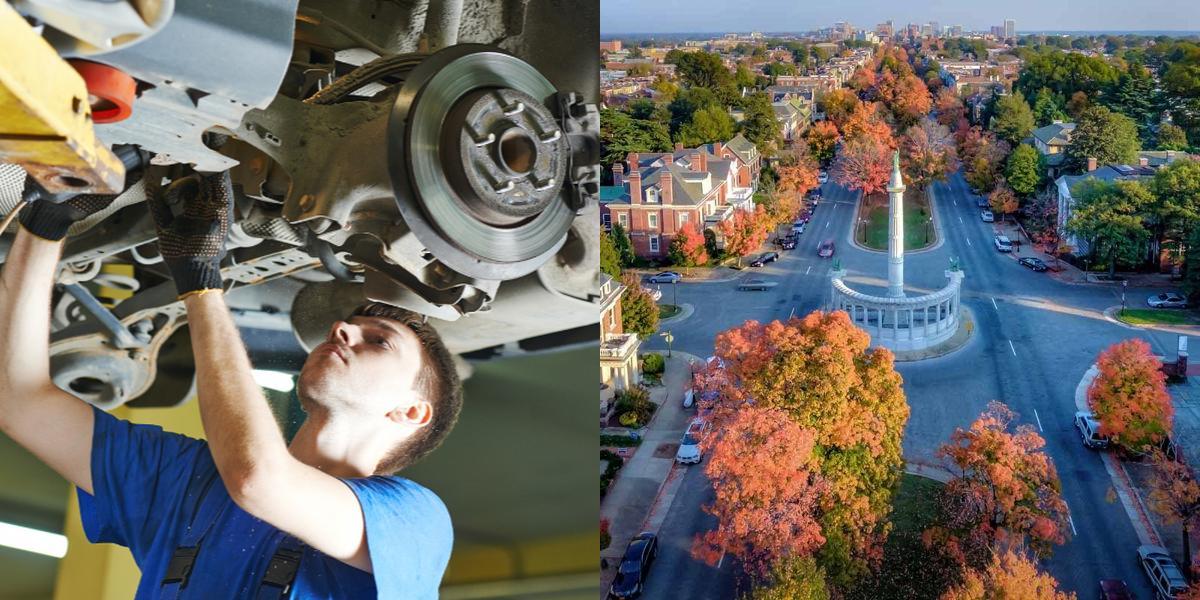How to Become an Auto Mechanic in Virginia (2025)

If you're looking to swap careers for a hands-on job with solid pay and steady demand right here in Virginia, becoming an Auto Mechanic is a smart move into the skilled trades. The state is home to over 33,000 of these essential technicians who earn a median salary of $51,750 per year, according to the U.S. Bureau of Labor Statistics. This guide gives you the practical, 5-step roadmap to get the right training, earn valuable certifications, and land a great mechanic job in Virginia.
5. Pursue Advanced Education & Specialization
Cars are always changing, so learning never stops! To boost your career and salary, focus on earning more ASE certifications, aiming for Master Technician status (passing A1-A8 tests). Consider specializing in high-demand areas like hybrid/electric vehicles, diesel engines, or advanced diagnostics.
How Long Does It Take to Become an Auto Mechanic?
You can complete a certificate program and be ready for an entry-level job in 6 to 12 months. An associate's degree takes about two years. Becoming a fully ASE-certified technician typically takes about 2-3 years total, combining schooling and the required work experience.
What About Licensing in Virginia?
Virginia does not require a state license to work as a general auto mechanic or technician. However, to perform official state safety inspections, you must obtain a Safety Inspector License issued by the Virginia State Police. ASE certification, while not a state license, is the universally recognized professional standard in the industry.
Where can I find Auto Mechanic classes in Virginia?
Dreambound is the largest platform for students to find and compare vocational training programs, including auto mechanic classes in Virginia. They offer a wide range of options to choose from, allowing you to find the program that best fits your needs and goals.
Dreambound makes it easy to search for classes near you, compare different programs, and get detailed information about each training provider. By using Dreambound, you can find the right auto mechanic class in Virginia that will help you start your career in the automotive industry.
Career Paths and Opportunities after Becoming an Auto Mechanic
A career as an ASE-certified technician opens up many doors:
- Master Technician: Become the top diagnostic expert at a dealership or large shop.
- Shop Foreman/Service Manager: Move into leadership, managing technicians and service operations.
- Specialty Technician: Focus on complex areas like transmissions, drivability, or electric vehicles.
- Shop Owner: Start your own independent repair business.
- Automotive Instructor: Teach at a technical college or high school.
Frequently Asked Questions
How much do auto mechanics make an hour in Virginia?
The median hourly wage for an auto mechanic in Virginia is approximately $24.88 per hour. Experienced, ASE Master Certified technicians often earn significantly more.
Do you need a degree to be a mechanic in Virginia?
No, a college degree is not required. However, completing a certificate or associate's degree from a technical college is the standard path and greatly improves your job prospects.
Can you get ASE certified without going to school?
Yes. You can qualify to take ASE exams with two years of documented, hands-on work experience. However, attending an accredited school is often faster and provides a more structured learning foundation.
Final Thoughts
Becoming a certified auto mechanic is an excellent career choice for individuals who are passionate about cars and enjoy working with their hands. By following the steps outlined in this guide, you can obtain your auto mechanic certification, increase your chances of finding a job, and embark on a rewarding career in the automotive industry.
Remember to continuously improve your skills and stay updated with the latest advancements in automotive technology. The automotive industry is constantly evolving, and by staying proactive and adaptable, you can seize new opportunities and achieve long-term success as an auto mechanic.
Whether you choose to work at a dealership, an independent repair shop, or start your own business, the skills and knowledge you acquire as an auto mechanic will always be in demand. Embrace the challenges and rewards of this dynamic field, and enjoy a fulfilling and satisfying career as an auto mechanic.
If you're thinking of a new career path, Dreambound offers in-depth guides to understand various job choices:

Winlynd Caballero is a member of Dreambound's Sales team. She helps in handling the company's finullcial transactions, generating reports, and school sales. Beyond her responsibilities in the realm of numbers and business, Winlynd finds herself deeply immersed in a world of art and music.



